Last Updated on January 17, 2023 by Soumya
After a refreshing one day of wandering around the Baroque streets of Ragusa, we could not help but take ourselves to the beautiful town of Modica in Sicily, yet another gem on the Sicilian Baroque crown. Modica is one of the eight Late Baroque Towns of the Val di Noto, a UNESCO heritage site.
Busy now? Save our post on Pinterest to read later.
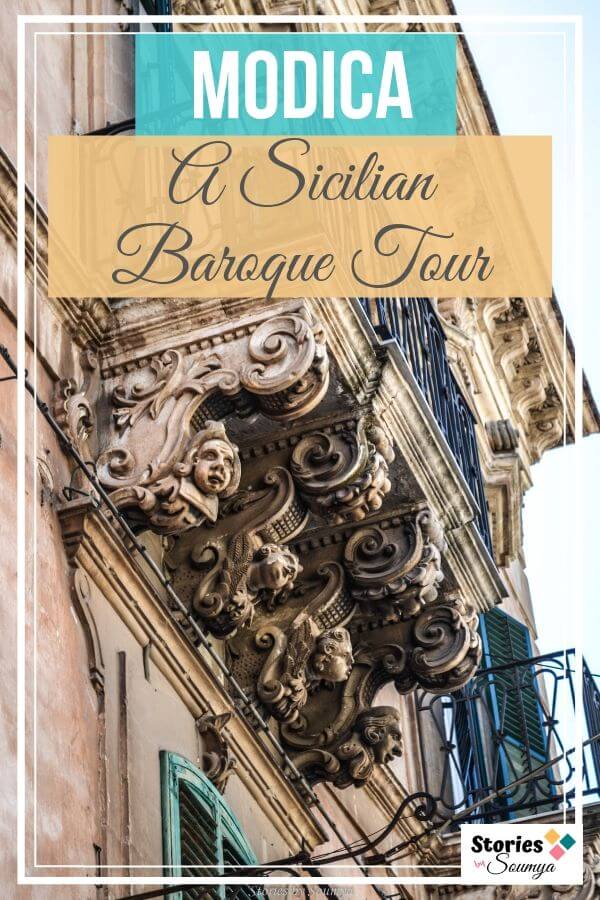
Please note: This post may contain affiliate links which means I may earn a commission if you make a purchase by clicking a link on this post. This will be at no additional cost to you. Affiliate links help me keep this website up and running. Thanks for your support!
A brief history of Sicilian Baroque
Sicilian Baroque took birth in the late 17th century on the island of Sicily when massive rebuilding work was taken up after the earthquake of 1693. The earthquake was devastating. It had affected more than 45 cities, destroying some of them completely.
Local artists, many of who had practiced Baroque in Rome, were employed to carry out the reconstruction work. This resulted in a unique combination of the Baroque art of mainland Italy and indigenous Sicilian elements. Sicilian Baroque architecture was born.
Sicilian Baroque retains the richly sculpted surfaces of traditional Baroque. Yet, it differentiates itself with expressions such as the grinning mask and the winged putto (the chubby cherub).
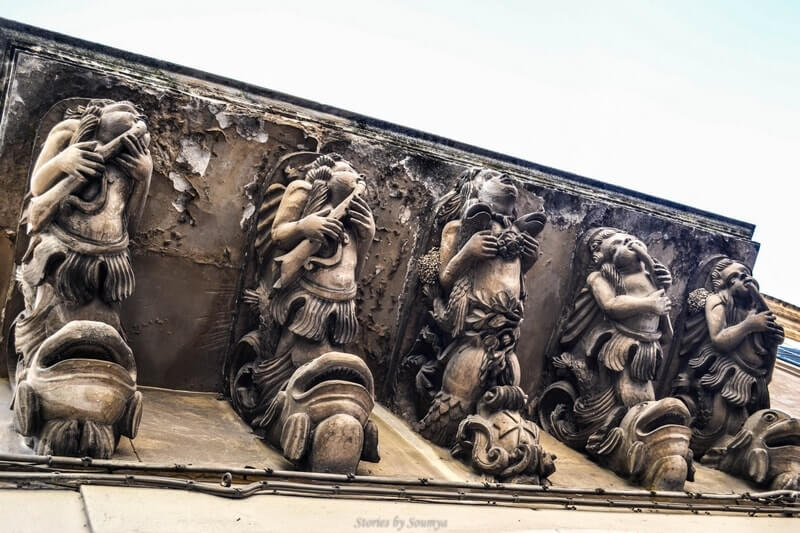
Let’s take a tour of Sicilian Baroque architecture in Modica Sicily.
We started our baroque tour at Corso Umberto I, the liveliest part of Sicily’s Modica. This course or avenue is flanked on both sides by lovely pieces of architecture, a majority of them styled the Baroque way.
Somebody rightly pointed out that walking through Corso Umberto is like taking a stroll through a Baroque living room. A unique balcony here. A lovely entrance portal there. The buildings will definitely fascinate you.
Need more inspiration to visit Sicily? Check out our collection of the 18 best things to do in Sicily.
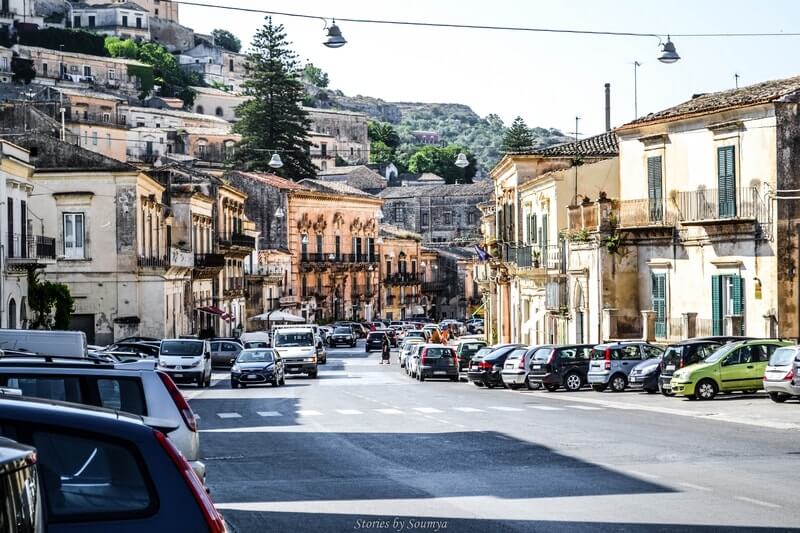
The Balconies
As you walk, you will notice majestic palaces and public buildings sporting elements of Sicilian Baroque architecture. The balconies of these buildings are especially striking.
Wrought-iron balustrades are held in place by console brackets. These brackets are decorated grinning masks, winged putti, flute players, mermaids, and dolphins. Balconies like these are typical of Sicilian Baroque architecture. They effuse a certain flamboyance that was unknown in the previously plainer balustrades.
Check out more Baroque balconies in our post on things to do in Ragusa Sicily, yet another UNESCO heritage town.


Cattedrale di San Pietro
One of the most remarkable Baroque buildings on this avenue is the Cattedrale di San Pietro. The impressive church is located atop a flight of stairs punctuated with life-sized statues of the Apostles.
Cattedrale di San Pietro has a beautiful facade. The second order is adorned with four statues. Take time to notice the wrought-iron balcony – an unlikely addition in a typical Baroque church.
As you climb up those steps, do not forget to stand and stare back at an impressive vista of the city.
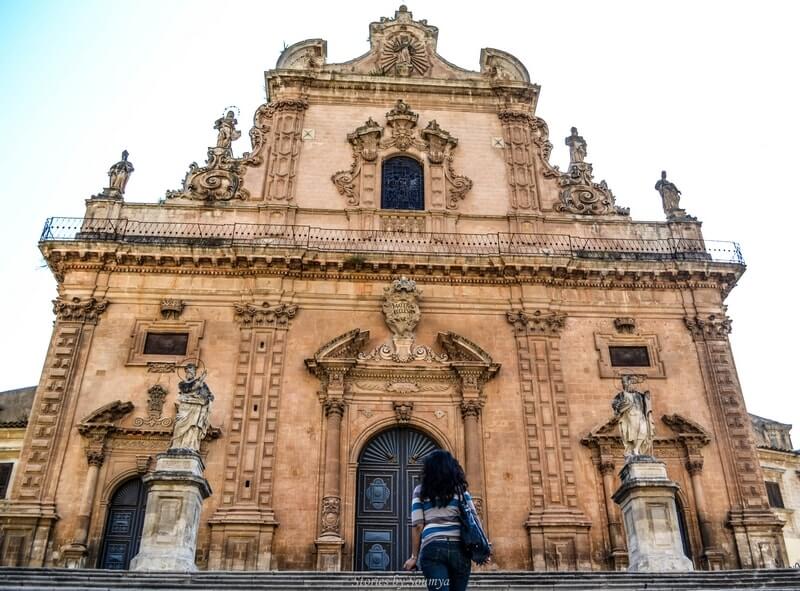
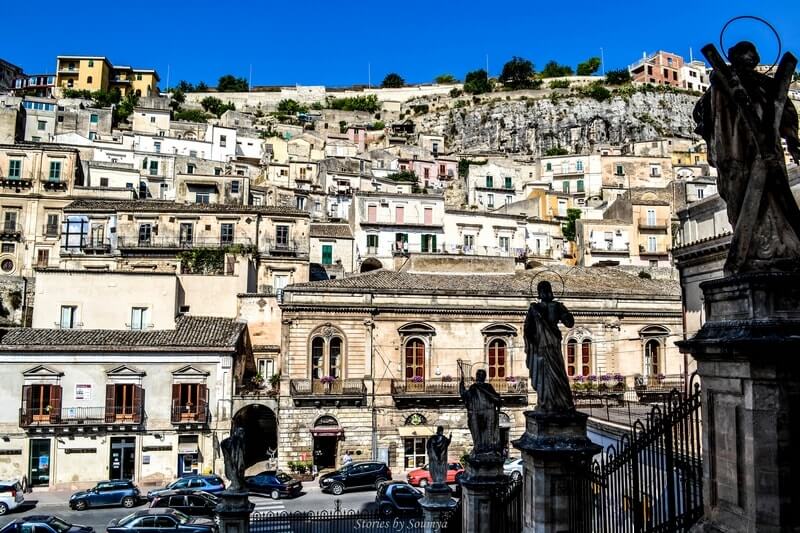
As you keep walking, you can appreciate other Baroque buildings (mostly from outside). Here, you can also see Modica’s clock tower or Torre del Orologio that looms over the city. This is probably one of the most photographed monuments in the city. Make sure you don’t miss out on the Garibaldi Theater, a beautiful example of the neoclassical style.
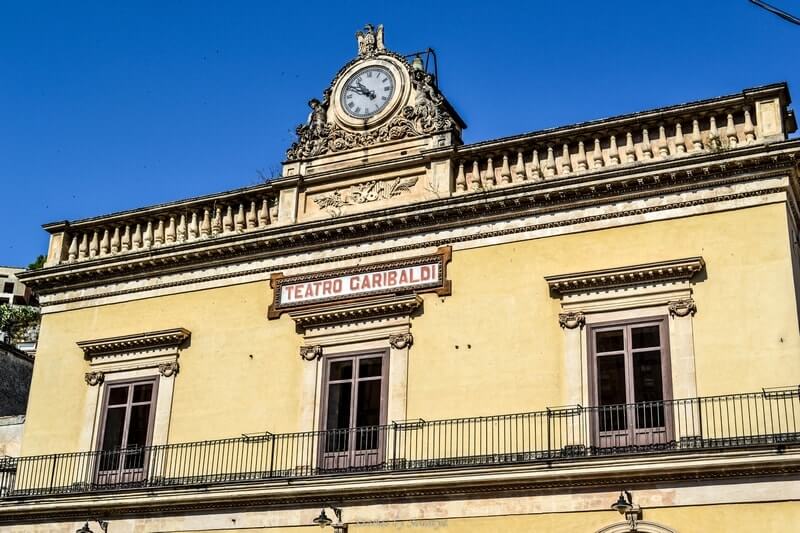
Once done with Corso Umberto, you can walk through narrow winding lanes and climb innumerable stairs to reach Corso S. Giorgio for another Baroque spectacle.
Cathedral San Giorgio
The cathedral of San Giorgio is the mother church of Modica and stands tall at the top of 260 elegant steps. The church is surrounded by gardens filled with fresh, pink bougainvillea.
The facade of the cathedral is awe-inspiring with plenty of Baroque elements such as columns and concave & convex surfaces. These strong curves provide the church with a sense of motion. A Sicilian belfry adorns the top of the central pediment – again a unique feature of Sicilian Baroque architecture.
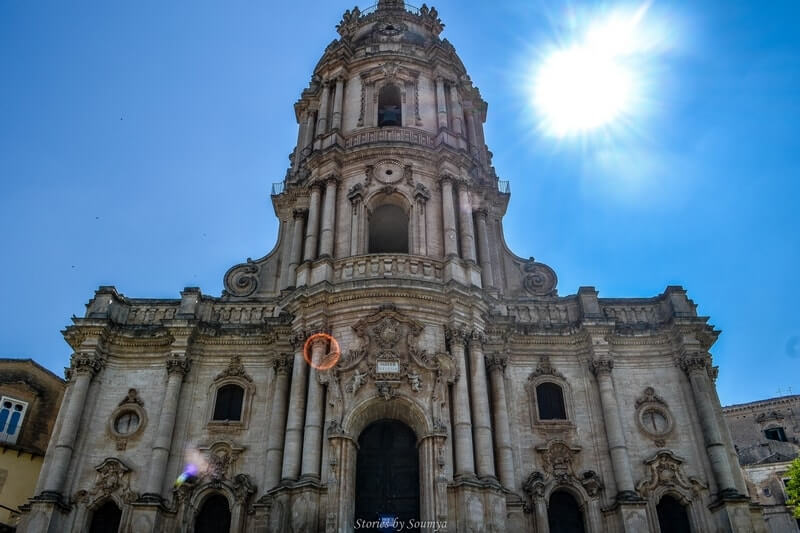
Once you are done appreciating the Cathedral of San Giorgio, take a glance at Palazzo Polara on your right, an austere Baroque building complete with Sicilian balustrades. This elegant home once belonged to the noble family of Polara in Modica. Today, it houses the Modern Art Gallery.
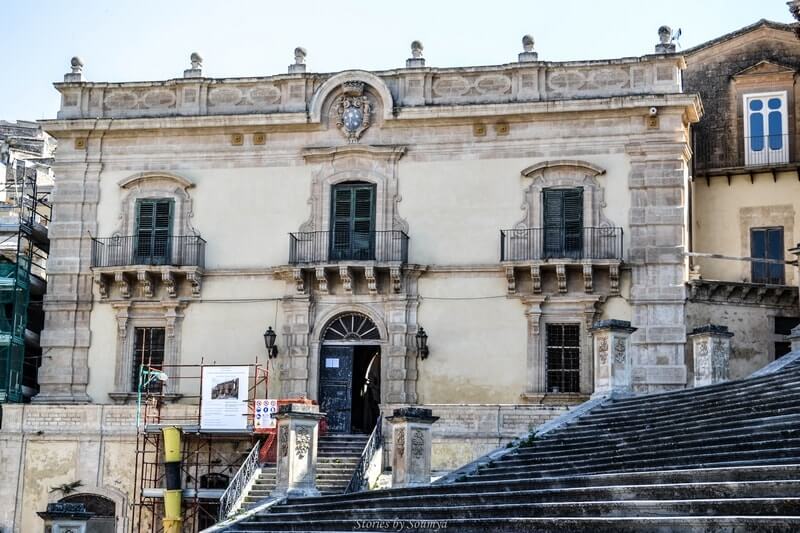
Other important Sicilian Baroque buildings in Modica
Other notable Baroque buildings are the palaces of Manenti, Napolino, Cannizzaro, and Cannata. Check out the facade of Palazzo Napolino. Two lion heads, with curtains of stone emerging from their mouths, flank the entrance. On top is a curved wrought-iron balcony with masks and florals decorating the bracket.
Once done with all the Baroque lavishness, head to one of Modica’s chocolate shops to have some Aztec-inspired chocolates. Another reason why Modica is so famous. But that’s a story for another day!
An end to my Sicilian Baroque tour of Modica!
Walking through the streets of Modica and taking in the sights of wrought iron balconies held up by figured brackets, adorned with masks and cherubs, was the treat of a lifetime.
While I loved the Baroque flourishes of Modica’s churches, those balconies and the art beneath them actually stole my heart.
I would love to go back again to appreciate some more of Sicilian Baroque architecture. What about you? Feel free to drop me a line below and let’s get the conversation going.
If you are planning a trip to Sicily and around, do read our posts on
- 16 Best Things To Do In Ragusa
- The Perfect 5-Day Itinerary for Sicily
- 18 Amazing Things to do in Sicily
- Visiting the Valley of Temples in Agrigento, Sicily
And while you are at it, don’t forget to follow us on Facebook and Twitter to get regular updates on historical travel destinations from across the world.
Loved our post on Modica’s Sicilian Baroque? Why not pin it?
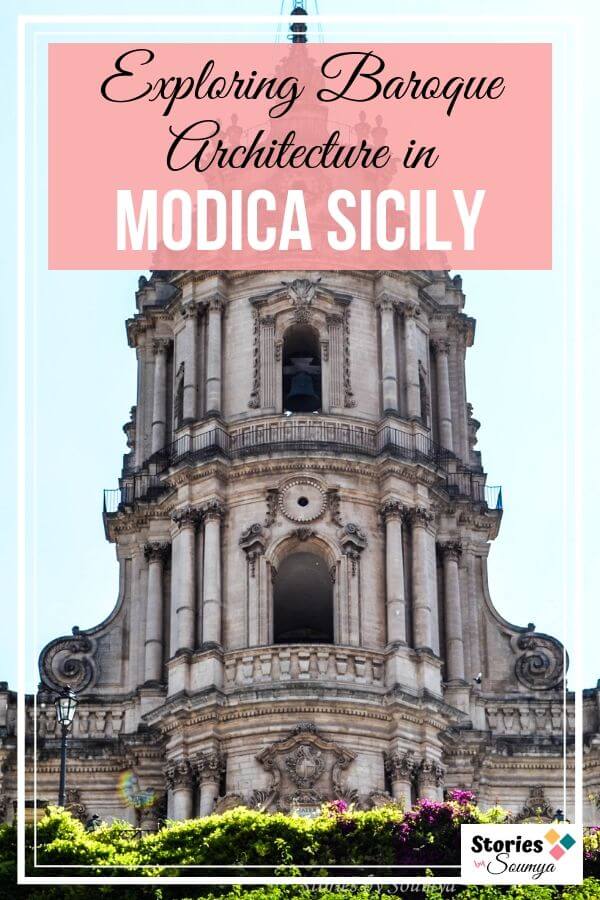
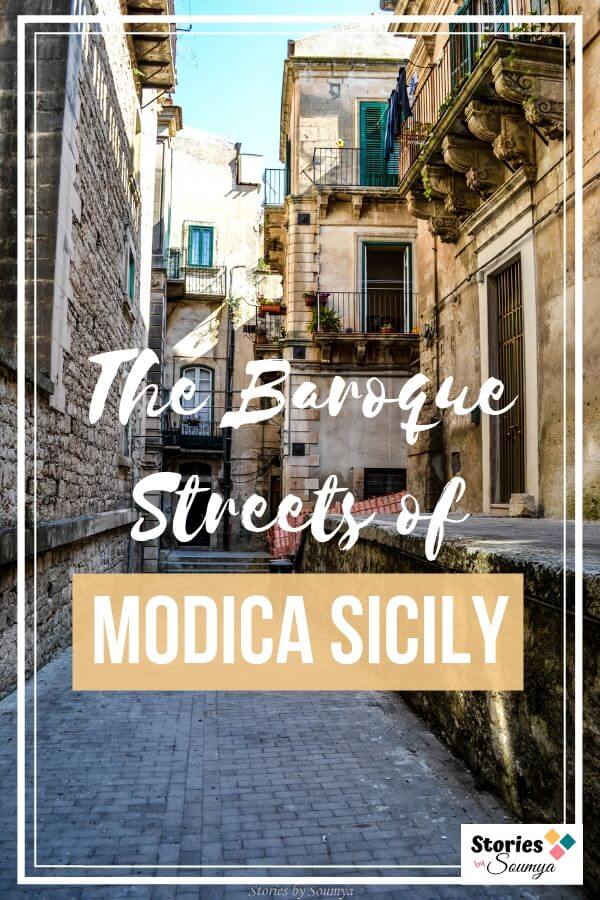

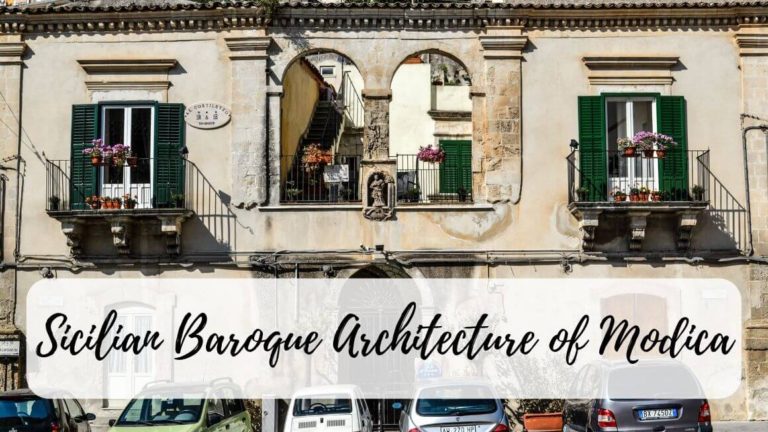
How beautiful!
I would love to go back to Sicily. I´ve only been to Catania, I feel Sicily has so much more to offer.
True. There’s so much to do in Sicily. I would love to go back too.
I can’t believe there is so much to see it Italy! I always wanted to visit Florence, Rome and Tuscany never really considered Amalfi coast – because of the crowd, and Sicily – because I thought it was not very well connected and didn’t have much to see. My, I couldn’t have been more wrong. Thank you fo showing me Sicily! 😀
I am so glad I could show you a bit of the non touristy Italy. It has tonnes of history, so that fits well with your interests. May not be the best connected place in Italy but the treasures are always found in the remotest corners.
I love the baroque style in architecture and painting! Thanks for covering them in this article! I should visit Modica next time we’re in Sicily! The favorite baroque architecture I’ve seen so far have been in Venice and Sicily. Some of the baroque churches in Portugal were lovely.
Yeah, Baroque is so beautiful. And Sicilian Baroque even more so. I am sure you will discover some more in Modica that I would love to read about.
Gorgeous. Modica is on my list for Sicily later on this year. I can’t wait to check it out. 🙂
I am so excited for you. Wish you an awesome trip.
Thank you lovely ?